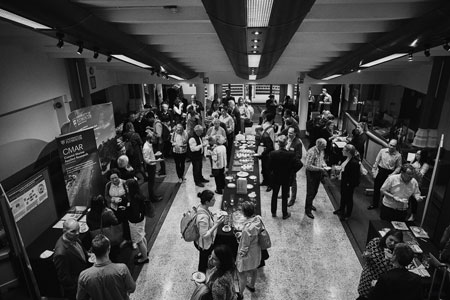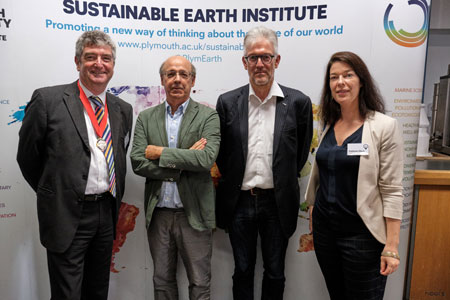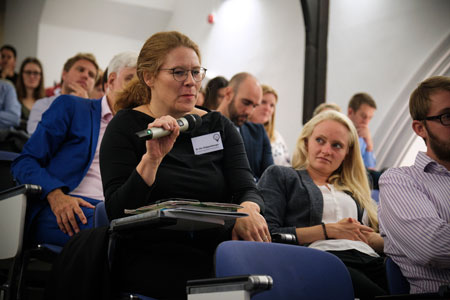Biennial XIII - Plymouth 2019
13th European Biennial of Towns and Town Planners 2019
Plymouth, Britain’s Ocean City
September 11-13 2019
Planning on the edge

“Plymouth is Britain’s Ocean City, quite simply, there is nowhere better to live, work and play!”
– Cllr. Tudor Evans OBE, Leader Plymouth City Council
Main conference venue: Plymouth University
Welcoming the ECTP-CEU 2019 Young Planners Workshop, based on the same theme of Planning on the Edge
In 2020 Plymouth will play a major part as lead City for the UK for the Mayflower 400 commemorations, celebrating 400 years since the Mayflower sailed from Plymouth to the United States of America.
It is fitting therefore that in 2019 Plymouth should play host to the European Council Of Spatial Planners by positioning Plymouth and the UK globally at the heart of this symbolic journey and showcasing our transforming city.
Plymouth is a spectacular waterfront city, the 14th largest in the UK and the largest port on the South coast of England. With over 260,000 residents, in excess of 50,000 students and attracting over 5.2 million visitors annually it is a thriving hub on the Devon/Cornwall boarder.
A one of the key cities and growth areas in the South West: Well connected - Green - Spectacular - Innovative - Leading the way
Plymouth believes in proactive, positive planning. It is the only city to have twice won the prestigious Royal Town Planning Institute Silver Jubilee Cup for its Local Development Framework Core Strategy in 2005 – the first and fastest produced for a major English city and then in 2015 for its innovative Plan for Homes which is delivering 5,000 homes in 5 years. 2016 saw Plymouth named as the best local planning authority.
The Strategic Planning & Infrastructure Department in Plymouth has a strong reputation for innovation and creativity and has a long track record of delivery in the fields of spatial planning, transport, housing and environmental policy all of which fall within its remit. It has therefore been able to develop a number of integrated approaches to policy development and delivery on the ground. We will be able to link workshops and presentations with plenary sessions involving senior local stakeholders and study visits to key projects and locations close to the venue.
This event is open to members of the ECSP, RTPI, all planning professionals and suppliers providing a mixture of business-to-business (B2B) workshops, industry updates, keynote speeches, panel debates and networking opportunities.
Study visits during the convention are to be proposed to delegates.
This edition of the Biennial is possible thanks to the partnership from:
Plymouth City Council, the University of Plymouth, Destination Plymouth and Conference Plymouth and of course the RTPI
See Driving Growth video detailing these developments here: Driving Growth video
Plymouth, Britain’s Ocean City
September 11-13 2019
Planning on the edge
The ECTP-CEU wishes to warmly thank the co-organisers, partners and sponsors:
- Plymouth City Council,
- Destination Plymouth,
- University of Plymouth
and the Royal Town Planning Institute
for the successful organisation of the XIIIth Biennial of European Towns and Town Planners "Planning on the edge",
held in Plymouth, 11-13 September, 2019

Plymouth is a splendid city in which to hold a biennial of the town planners of Europe. It is well-known for its maritime history, not least for the many mariners who have sailed into and out of Plymouth, including the most renowned seaman of the sixteenth century, Frances Drake, and most recently, Greta Thunberg, the young climate change activist. It also has a long and auspicious history of good planning, most recently being the only place in the UK to have won the Royal Town Planning Institute’s esteemed Silver Cup three times. As a result, Plymouth had much to offer the 13th biennial of the ECTP-CEU where nearly 200 planners and a propitious set of keynote speakers and other contributors arrived to exchange knowledge and ideas about planning.

Paul Barnard Plymouth City Council - Lord Mayor of Plymouth - Michael Stein ECTP-CEU
The main aim of ECTP-CEU biennials is to bring together planners and their associated stakeholders to discuss current issues and share information. Ever since its inception in 1995, the biennial has faced up to the challenges of European cities and territories. How to create and implement sustainable cities is without argument one of the main issues with which it has grappled over the years.
The theme of the Plymouth Biennial was ‘planning on the edge’. Undoubtedly a good subject for study in 2019, it covered not just marine and coastal edges, but the edge of society, the edge of cities and the precipice of climate change upon which we hang. In addition, cities like Plymouth are a long way from the centre of their country, coping with issues of poor connectivity and deprivation. Over two days, contributors from all over Europe – east and west, north and south – spoke about and engaged in debate about these important matters.

The organisers and sponsors of the conference, Plymouth City Council, Destination Plymouth, University of Plymouth and the Royal Town Planning Institute, had a rich and engaging backdrop from which to draw the content of the biennial. The start of the conference, a welcome by the Lord Mayor of Plymouth, demonstrated the commitment of the city to good planning. When politicians support planning and resource it properly, success will follow. The Lord Mayor’s house overlooks the world-famous Plymouth Hoe with its spectacular setting of seascape, islands and harbours, giving the maritime context to the city. Unfortunately, the docks of Plymouth also attracted destruction during the 1940s, leading to its comprehensive planning and re-building afterwards and ever since. The first post-war plan by the famous town planner, Sir Patrick Abercrombie was ambitious with a grand city centre built on the lines of a grid with impressive boulevards. The layout of Abercrombie’s city remains today, but poverty and economic decline, particularly due to dereliction and de-industrialisation in coastal areas, have taken their toll and much needs to be done to re-instate Plymouth’s former glory. Conference attendees were introduced to this fascinating history of post-war re-construction and how it shaped the philosophy of Plymouth, along with the latest successes and plans for the city from the modern planners.

Ian Tant RTPI - Ignacio Peman ECTP-CEU - Joris Scheers ECTP-CEU - Catherine Vilquin CUB
One of the first places shown was a successful urban regeneration scheme (housing and leisure uses) in the magnificent restoration of Royal William Yard, a Grade I, listed ex-Royal Naval victualling yard. The older areas of Plymouth have also been restored, including the Barbican area, a hub for markets, restaurants and pubs and an important tourist destination. On the weekend of the conference, Plymouth was designated as the first National Marine Park, which will ‘improve the conservation of natural beauty, wildlife and cultural heritage in coastal waters and provide more opportunities for people to understand and enjoy the country’s finest marine landscapes.’

Delegates from around Europe were able to share their experiences of ‘living on the edge’. Regional planning has a big role to play, and stories from Hong Kong and Guangdong, France, Spain and Ireland reinforced the importance of cross-border working. The large number of presentations relating to the urban-rural fringe, urban edge and places in-between demonstrated how important this issue is across the whole of Europe. Planners from Germany, England, Slovenia, Bosnia, Herzegovina, Croatia, Montenegro, Italy, and Spain talked about their research into various ways of treating the edge of the city. Is the urban containment tool of the green belt in England still important today? How do cities retain their identity and cultural landscapes in the countries of the former Yugoslavia, whilst maintaining cross-border understanding? Is the German policy and method of providing housing in rural areas successful as a way of offering expansion of housing outside the cities? Is the kind of edge-city planning currently happening in France sustainable?
There were several papers about marine planning. From Scotland, England and Northern Ireland, planners spoke about the emergent plans for the sea and the increasing and competing demands from windfarms, fisheries and fishing, shipping, conservation, as well as how the new legislation for statutory marine spatial plans would work.

Ronal Waterman
Coastal, river and waterfront areas were prominent parts of the conference presentations. What can be learnt from the Dutch about their plans for keeping the sea at bay? Waterfront regeneration was covered with some French examples about shrinkage in port cities, including Marseilles. Looking at ways of using rivers and coasts was an issue in Greece and Italy; and the island of Hvar has important tourist management issues. Coastal areas are partly taking the brunt of the climate crisis. The conference heard from planners from Norway who are planning for the harshest climatic conditions and from England about the kind of strategic plans necessary to plan coastal towns and areas, including Plymouth itself. Vital plans made by nature and environmental agencies were expounded by English planners, especially for climate change and with regard to coastal erosion and management, including the use of scientific measures for coastal protection. Finally, what can be done to plan for coastal areas without considering how best to engage the public in their use and habitation of the coasts? In Plymouth, public consultation has won them awards, and the conference heard about the ways in which the public want to be involved in decision-making in Ireland with regard to marine planning.

Alongside the main biennial was a young planners’ workshop. Young planners from all over Europe submitted their ideas around the central theme and were welcomed into the body of the conference to explain their views and expand their knowledge. This aspect of the ECTP-CEU might be one of its most important roles, since young planners are the policymakers of the future. They will learn from each other in the global world – what works and what does not work. They are more likely to work in different countries during their careers as planners and the challenge of climate change and sustainability will be the challenge of their future and of the next generation. An impressive and enthusiastic array of young planners from Europe engaged with the biennial – giving hope for the future of the ECTP-CEU.

Richard Blyth RTPI
No report can do justice to the breadth and extent of knowledge exchanged, nor to the hundreds of independent conversations at the ECTP-CEU Biennial. Each reinforces our desire and fervour for town planning and the means by which we can persuade communities, governments, politicians and other professionals that without planning the future is bleak. But with the enthusiasm and zest for knowledge and ideas demonstrated at the Plymouth Biennial, the future for planners and planning across Europe will be sustained.
Biennial report by Janet Askew, MRTPI, Vice President of the ECTP-CEU
Special thanks to:
Rebecca Miller, Leon Thompson, Stephen Essex, Paul Barnard, Ian Tant, Richard Blyth, Steve Mallinson, Richard Ball - Lord Mayor of Plymouth, and of course:
- all speakers
- all young planners
- all ECTP-CEU delegates
- and all attendees
Please also have a look at:
-> our Presidents Michael Stein speech at Lord Mayors house Plymouth

Presentations:
Session A - Lessons from a Strategic Renewable Energy Storage Infrastructure in a Frontier Zone Louis R. WildenboerSession A - Lessons from a Strategic Renewable Energy Storage Infrastructure in a Frontier Zone Louis R. Wildenboer
Session A - Miracle or Disaster - Vivian Ko and Jeffrey Ng
Session A - Where is the edge of transition - Vit Rezac
Session A - Improving France and Spain cross-border links - Beatriz Santos and Raquel Aragon
Session B - Edges in Between - Robert Bedner
Session B - Southend 2050 - Peter Geraghty
Session B - Coastal settlements and regions have a future - Petter Wiberg
Session B - Urban Blue Acupuncture - Mathew White
Session C - A Wardian case of Planning - Santos Zambrano
Session C - Case study in Ljubljana - Kostanjsek
Session C - Containment a normative frontier - Ute Knippenberger
Session C - Green Belts and Governance - Charles Goode
Session D - Cultural Landscape of former Yugoslavia and Mediteranian Cities - Aleksandra Đorđevic, Mladen Pesic, Milica Milojevic
Session D - Riverfront regeneration in Belgrade - Ksenija Krsmanovic
Session E - Approaches to Marine Planning - Anne-Michelle Slater and Jim Claydon
Session E - Comparative Analysis of MSP across the UK - Ritchie and McElduff
Session E - Terrestrial integration in England - Joe Smithyman
Session E - Velo Grablje - Marijana Zlodre
Session F - Rediscovering Countryside after the Urban Crisis - Juan Luis de las Rivas Sanz
Session F - Resilient planning for urban rivers - Marta Ducci & Giulia Maroni
Session F - Spanish Urban Edges - Pablo de la Cal Nicolas
Session G - Large Seaport of Marseilles - Frederic Dagnet
Session G - Shrinkage in port cities European trajectories and resilience - Victoria Pinoncely
Session G - Regenerative flows - Javier Tobías González
Session G - Shifting the narrative - Eleni Gklinou
Session H - Long term resilience on the coast – Andrew Colema
Session H - The role of science in the planning of coastal protection - Amani Becker
Session H - Natural Englands Vision for the coast - Corine Dyke and Amanda Newsome
Session H - Mortas cine and the consultation problem - Sybil Berne
A philosophy of planning - Jonathan Bell
European trends in Planning - Geza Salamin
Keynote - Integrated Coast & Delta Policy - Ronald E Waterman
Keynote - Physical Geography as an Influencer - Bernie Foulkes
Plymouth Marine National Park - Kat Deeney
Post war reconstruction of Plymouth - Stephen Essex